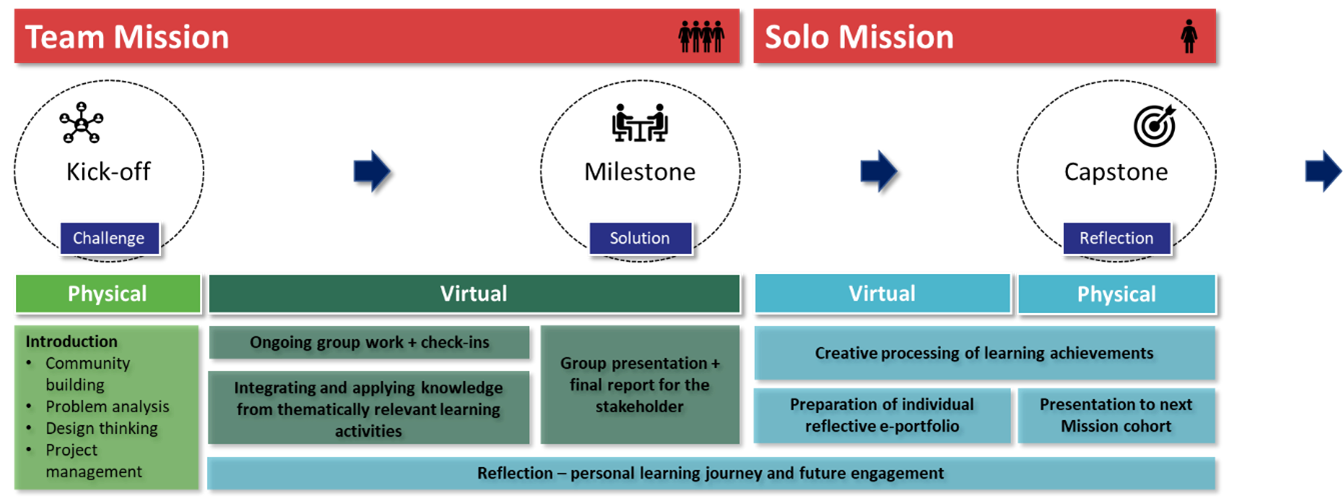EPI-WIKI
Tabs
EPIC Missions

A challenge-based, interdisciplinary and collaborative learning offer

At a Glance
Co-created and constructively tackled by:
- EPICUR students
- EPICUR teachers and
- External stakeholders
Duration:
- One semester: Team Mission
- Two semesters: Team AND Solo Mission
Workload/ECTS:
- Team Mission - 6 ECTS
- Solo Mission - 3 ECTS
Mode:
Blended
About the EPIC Mission concept
The EPIC Mission is a two-semester challenge-based learning offer in which a diverse group of students from across the alliance comes together to solve a real-world problem for a real-world stakeholder with the academic support of their mission guides. EPIC Missions are cohort-based with the students at the centre shaping their journey through the European Track.
As blended mobility opportunities, they start with a physical kick-off event followed by online collaboration throughout the mission period and a physical reunion at the end. EPIC Missions consist of two parts: a challenge-based team mission (fall/winter semester, 6 ECTS) and a reflective solo mission (spring/summer semester, 3 ECTS).
EPIC Missions integrate learning from various disciplines in thematic challenge areas (Natural and Societal Sustainability, European Identities). They are transversal in nature and offer students from a variety of academic backgrounds the opportunity to addressing each mission’s challenge.
The purpose of EPIC Missions is twofold:
- On the one hand, it is a learning format that supports the acquisition of cross-cutting and transversal competences
- On the other hand, the missions themselves are also thematic, which means that they support the development of thematic competences (understanding research strands; theory understanding and development; field-specific methodologies) and, more importantly, are meant to shape the students’ thematic learning journey through a European Track.
By cultivating transversal and thematic competence, EPIC Missions set students up for success in other Learning Ventures (e.g., additional courses, internships, service learning, or other co-curricular project) within the European Tracks.
Piloted EPIC Missions
In the pilot EPIC Missions, students tackled contemporary challenges set by two external stakeholders, the City of Freiburg and the German-American institute Carl-Schurz-Haus:
- Across the Atlantic: How can art support relations between the EU and the USA? (Carl-Schurz-Haus, Freiburg)
- Combining sustainable & smart: How can Freiburg promote green digitalisation (City of Freiburg)
Upon completing the team mission, students will be able to...
- actively engage in finding profound solutions to real-world problems
- collaborate in interdisciplinary, virtual teams, including collaborating with actors from different fields of practice across cultures and borders
- identify and apply appropriate research methods connected to the topic of their respective mission
- apply project management and design thinking skills in ambiguous and complex projects
- successfully communicate and present relevant information
- demonstrate understanding of theories, concepts and methods relevant to solving a given problem in the field of their respective mission
- critically reflect on their individual learning journey, values and perceptions
- identify and verbalise individual learning achievements
- illustrate how different knowledge areas and perspectives contribute to the solution of a real-world problem
- act as multipliers of their learning experience
A pilot mission in the field of European identities has taken place in the academic year 2021/22 with the topic “Across the Atlantic: How can art support relations between the EU and the USA?” and was provided by the Carl-Schurz-Haus, a German-American cultural institute in Freiburg.
Across the Atlantic: How can art support relations between the EU and the USA? (Carl-Schurz-Haus, Freiburg)
Today, we are all faced with never-seen-before challenges and changes on a global scale. Things that were considered stable only a few decades ago have turned out to be fragile, such as the roles Europe and America play on the global stage. The strong post-war connections between and the supposedly shared values of the US and Europe have been crumbling on many levels. The Carl-Schurz-Haus in Freiburg has organised readings, exhibitions and courses dedicated to the relation and understanding between Germany and the US. Your EPIC Mission is to develop a concept for the Carl-Schurz-Haus that (1) demonstrates what cultural events and formats are most appropriate to depict today’s situation and (2) discusses how different target groups can be reached.
- Cultural Change and Contested European Identities
- Memories and Images of Europe
A pilot mission in the field of Natural and Societal Sustainability has taken place in the academic year 2021/22 with the topic “Combining sustainable & smart: How can Freiburg, Germany promote green digitalisation” and was provided by the City of Freiburg.
Combining sustainable & smart: How can Freiburg promote green digitalisation (City of Freiburg)
There are several challenges awaiting cities in the future: new urbanisation trends that reshape cities and their surroundings, changes in lifestyles and preferences, demographic developments, overburdened infrastructure, tourism, air and noise pollution, management of limited resources, etc. In many places around the world, city councils and private companies are trying to tackle such problems with manifold interconnected initiatives whose purpose is to build the infrastructure and services for the new cities of the 21st century. Your EPIC Mission relates to issues the City of Freiburg is trying to address: Would Smart City technologies have a benefit for Freiburg? How could they be made beneficial? And what is the perspective of different stakeholders on these technologies?
- Sustainable innovations and social justice
- Transformative cities
Related Wiki pages
These Wiki pages might also be interesting for you:
Back to > DESIGN> Examples of LAS-Inspired Learning & Teaching
Last edited: 26. Oct 2022, 10:55, [sr1149@uni-freiburg.de]

